Impact of CSI Shows on Society's Perception of Criminal Justice System
VerifiedAdded on 2019/09/20
|14
|3319
|245
Report
AI Summary
The popular TV show CSI (Crime Scene Investigation) has increased public perception that crime scene investigators perform DNA analysis and interrogate suspects, leading to a false understanding of the forensic science process. This misconception has led to an increase in students dropping out of forensic science programs. Despite the negative impact on society, educators can exploit this effect by using it as a tool to stimulate learning. The show simplifies complex scientific concepts and often portrays unrealistic scenarios. In reality, crime scene investigators are civilians who focus on analyzing evidence, not law enforcement or interrogation. The study highlights the need for education to correct these misconceptions and promote a better understanding of forensic science.
Contribute Materials
Your contribution can guide someone’s learning journey. Share your
documents today.
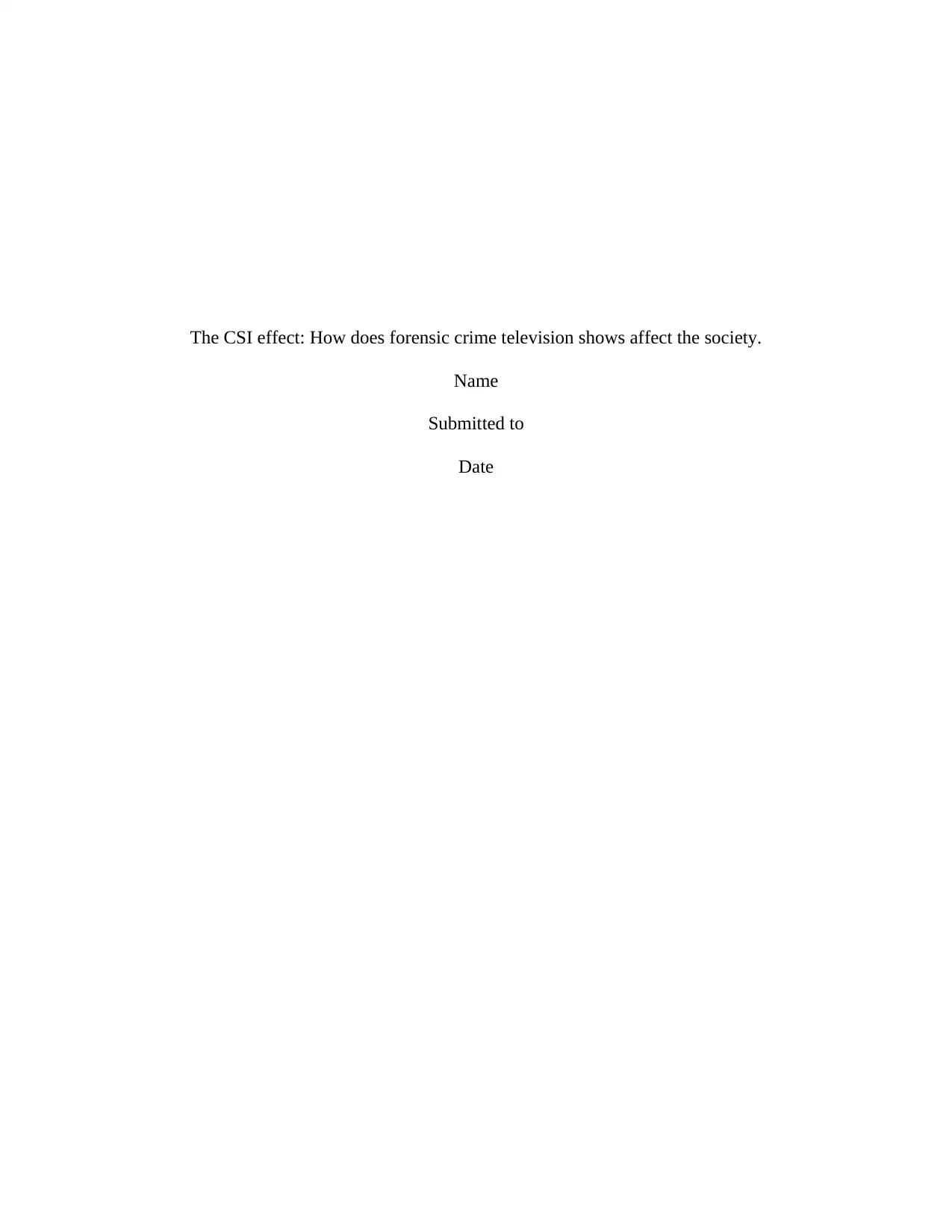
The CSI effect: How does forensic crime television shows affect the society.
Name
Submitted to
Date
Name
Submitted to
Date
Secure Best Marks with AI Grader
Need help grading? Try our AI Grader for instant feedback on your assignments.
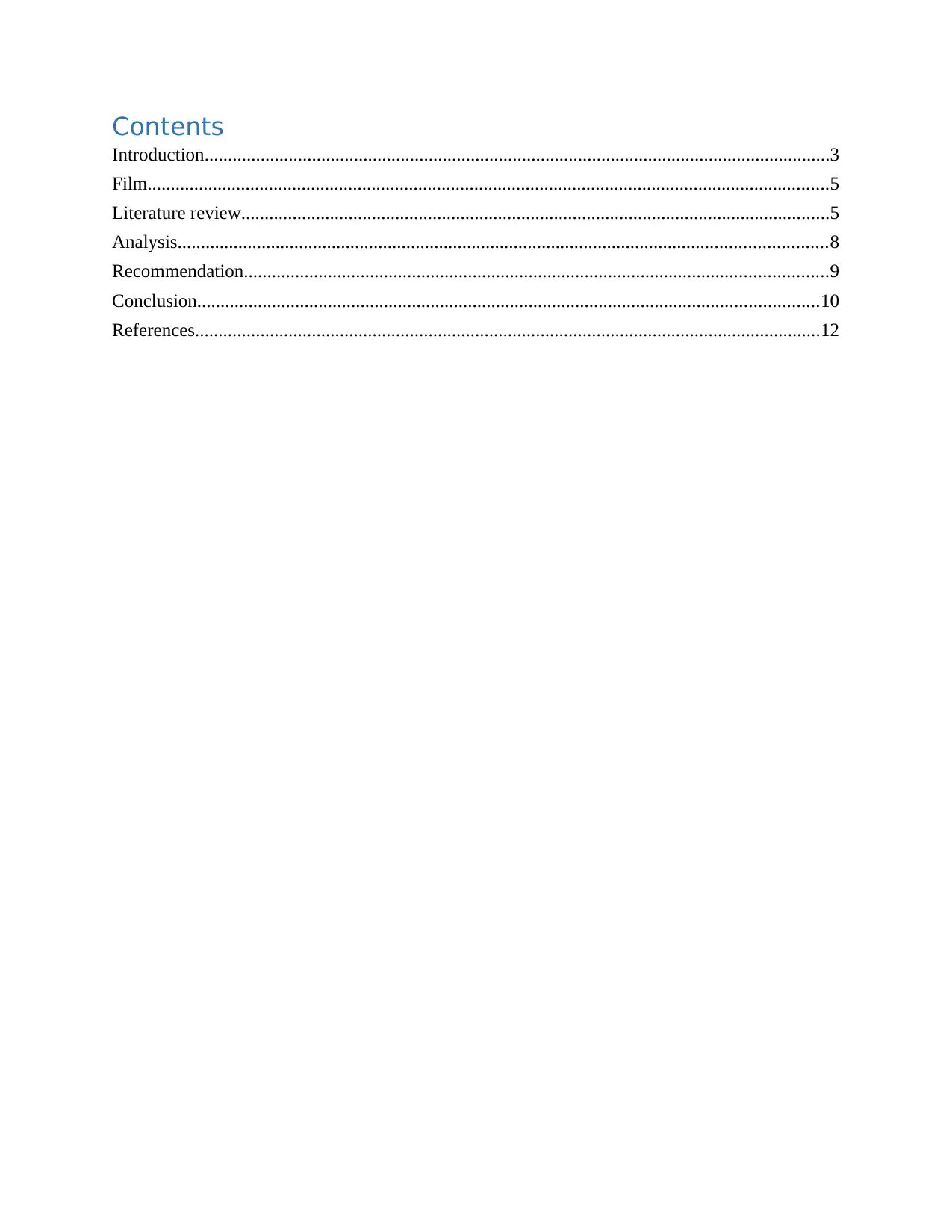
Contents
Introduction......................................................................................................................................3
Film..................................................................................................................................................5
Literature review..............................................................................................................................5
Analysis...........................................................................................................................................8
Recommendation.............................................................................................................................9
Conclusion.....................................................................................................................................10
References......................................................................................................................................12
Introduction......................................................................................................................................3
Film..................................................................................................................................................5
Literature review..............................................................................................................................5
Analysis...........................................................................................................................................8
Recommendation.............................................................................................................................9
Conclusion.....................................................................................................................................10
References......................................................................................................................................12
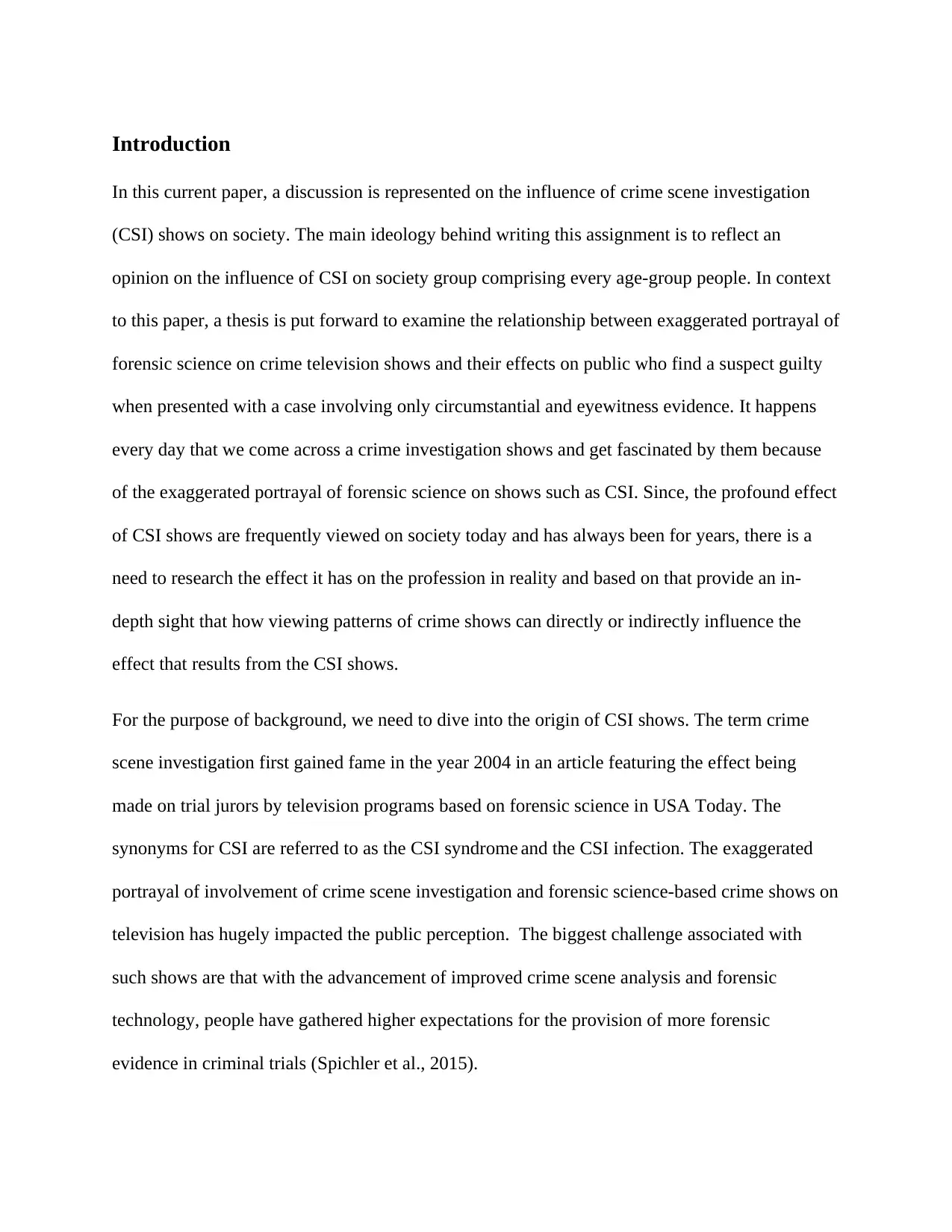
Introduction
In this current paper, a discussion is represented on the influence of crime scene investigation
(CSI) shows on society. The main ideology behind writing this assignment is to reflect an
opinion on the influence of CSI on society group comprising every age-group people. In context
to this paper, a thesis is put forward to examine the relationship between exaggerated portrayal of
forensic science on crime television shows and their effects on public who find a suspect guilty
when presented with a case involving only circumstantial and eyewitness evidence. It happens
every day that we come across a crime investigation shows and get fascinated by them because
of the exaggerated portrayal of forensic science on shows such as CSI. Since, the profound effect
of CSI shows are frequently viewed on society today and has always been for years, there is a
need to research the effect it has on the profession in reality and based on that provide an in-
depth sight that how viewing patterns of crime shows can directly or indirectly influence the
effect that results from the CSI shows.
For the purpose of background, we need to dive into the origin of CSI shows. The term crime
scene investigation first gained fame in the year 2004 in an article featuring the effect being
made on trial jurors by television programs based on forensic science in USA Today. The
synonyms for CSI are referred to as the CSI syndrome and the CSI infection. The exaggerated
portrayal of involvement of crime scene investigation and forensic science-based crime shows on
television has hugely impacted the public perception. The biggest challenge associated with
such shows are that with the advancement of improved crime scene analysis and forensic
technology, people have gathered higher expectations for the provision of more forensic
evidence in criminal trials (Spichler et al., 2015).
In this current paper, a discussion is represented on the influence of crime scene investigation
(CSI) shows on society. The main ideology behind writing this assignment is to reflect an
opinion on the influence of CSI on society group comprising every age-group people. In context
to this paper, a thesis is put forward to examine the relationship between exaggerated portrayal of
forensic science on crime television shows and their effects on public who find a suspect guilty
when presented with a case involving only circumstantial and eyewitness evidence. It happens
every day that we come across a crime investigation shows and get fascinated by them because
of the exaggerated portrayal of forensic science on shows such as CSI. Since, the profound effect
of CSI shows are frequently viewed on society today and has always been for years, there is a
need to research the effect it has on the profession in reality and based on that provide an in-
depth sight that how viewing patterns of crime shows can directly or indirectly influence the
effect that results from the CSI shows.
For the purpose of background, we need to dive into the origin of CSI shows. The term crime
scene investigation first gained fame in the year 2004 in an article featuring the effect being
made on trial jurors by television programs based on forensic science in USA Today. The
synonyms for CSI are referred to as the CSI syndrome and the CSI infection. The exaggerated
portrayal of involvement of crime scene investigation and forensic science-based crime shows on
television has hugely impacted the public perception. The biggest challenge associated with
such shows are that with the advancement of improved crime scene analysis and forensic
technology, people have gathered higher expectations for the provision of more forensic
evidence in criminal trials (Spichler et al., 2015).
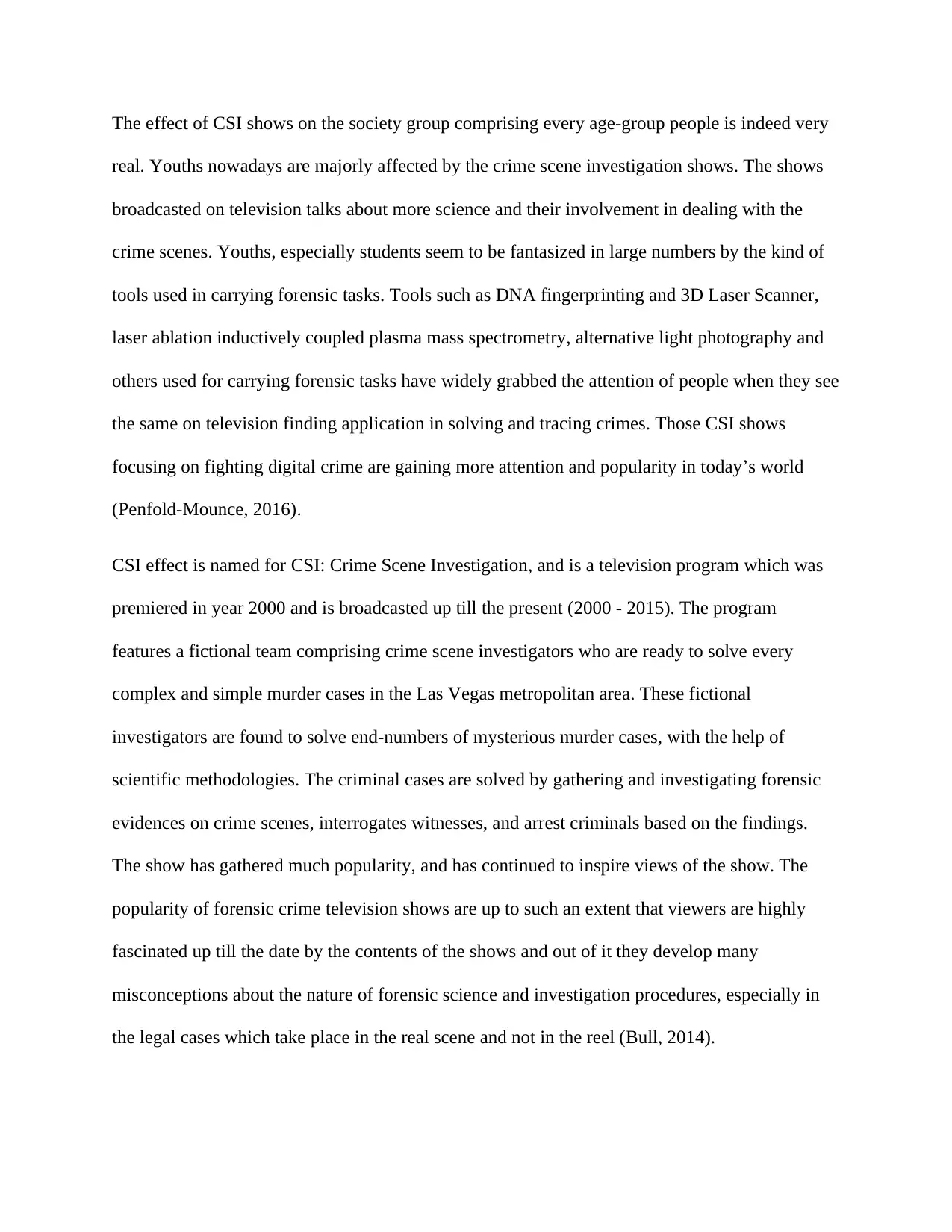
The effect of CSI shows on the society group comprising every age-group people is indeed very
real. Youths nowadays are majorly affected by the crime scene investigation shows. The shows
broadcasted on television talks about more science and their involvement in dealing with the
crime scenes. Youths, especially students seem to be fantasized in large numbers by the kind of
tools used in carrying forensic tasks. Tools such as DNA fingerprinting and 3D Laser Scanner,
laser ablation inductively coupled plasma mass spectrometry, alternative light photography and
others used for carrying forensic tasks have widely grabbed the attention of people when they see
the same on television finding application in solving and tracing crimes. Those CSI shows
focusing on fighting digital crime are gaining more attention and popularity in today’s world
(Penfold-Mounce, 2016).
CSI effect is named for CSI: Crime Scene Investigation, and is a television program which was
premiered in year 2000 and is broadcasted up till the present (2000 - 2015). The program
features a fictional team comprising crime scene investigators who are ready to solve every
complex and simple murder cases in the Las Vegas metropolitan area. These fictional
investigators are found to solve end-numbers of mysterious murder cases, with the help of
scientific methodologies. The criminal cases are solved by gathering and investigating forensic
evidences on crime scenes, interrogates witnesses, and arrest criminals based on the findings.
The show has gathered much popularity, and has continued to inspire views of the show. The
popularity of forensic crime television shows are up to such an extent that viewers are highly
fascinated up till the date by the contents of the shows and out of it they develop many
misconceptions about the nature of forensic science and investigation procedures, especially in
the legal cases which take place in the real scene and not in the reel (Bull, 2014).
real. Youths nowadays are majorly affected by the crime scene investigation shows. The shows
broadcasted on television talks about more science and their involvement in dealing with the
crime scenes. Youths, especially students seem to be fantasized in large numbers by the kind of
tools used in carrying forensic tasks. Tools such as DNA fingerprinting and 3D Laser Scanner,
laser ablation inductively coupled plasma mass spectrometry, alternative light photography and
others used for carrying forensic tasks have widely grabbed the attention of people when they see
the same on television finding application in solving and tracing crimes. Those CSI shows
focusing on fighting digital crime are gaining more attention and popularity in today’s world
(Penfold-Mounce, 2016).
CSI effect is named for CSI: Crime Scene Investigation, and is a television program which was
premiered in year 2000 and is broadcasted up till the present (2000 - 2015). The program
features a fictional team comprising crime scene investigators who are ready to solve every
complex and simple murder cases in the Las Vegas metropolitan area. These fictional
investigators are found to solve end-numbers of mysterious murder cases, with the help of
scientific methodologies. The criminal cases are solved by gathering and investigating forensic
evidences on crime scenes, interrogates witnesses, and arrest criminals based on the findings.
The show has gathered much popularity, and has continued to inspire views of the show. The
popularity of forensic crime television shows are up to such an extent that viewers are highly
fascinated up till the date by the contents of the shows and out of it they develop many
misconceptions about the nature of forensic science and investigation procedures, especially in
the legal cases which take place in the real scene and not in the reel (Bull, 2014).
Paraphrase This Document
Need a fresh take? Get an instant paraphrase of this document with our AI Paraphraser
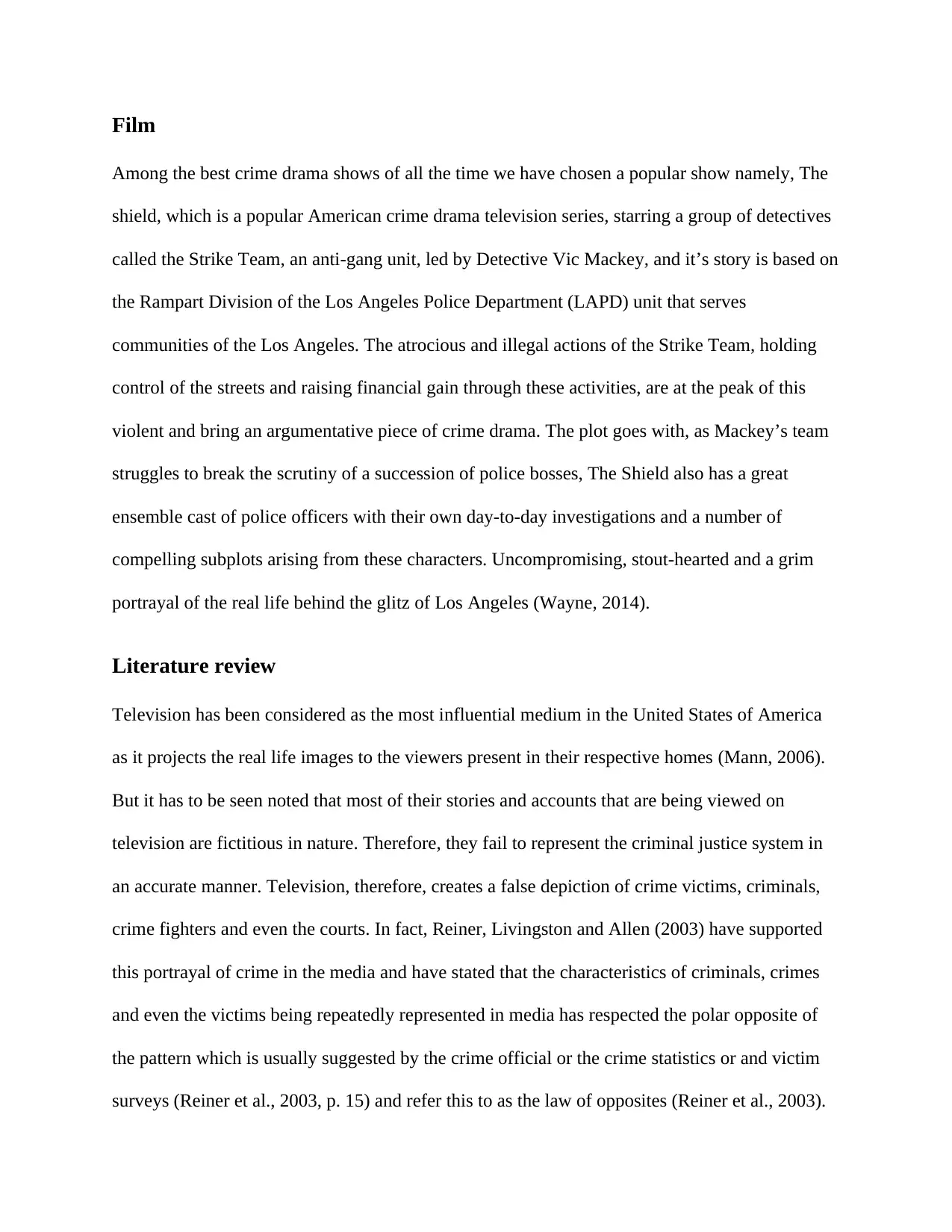
Film
Among the best crime drama shows of all the time we have chosen a popular show namely, The
shield, which is a popular American crime drama television series, starring a group of detectives
called the Strike Team, an anti-gang unit, led by Detective Vic Mackey, and it’s story is based on
the Rampart Division of the Los Angeles Police Department (LAPD) unit that serves
communities of the Los Angeles. The atrocious and illegal actions of the Strike Team, holding
control of the streets and raising financial gain through these activities, are at the peak of this
violent and bring an argumentative piece of crime drama. The plot goes with, as Mackey’s team
struggles to break the scrutiny of a succession of police bosses, The Shield also has a great
ensemble cast of police officers with their own day-to-day investigations and a number of
compelling subplots arising from these characters. Uncompromising, stout-hearted and a grim
portrayal of the real life behind the glitz of Los Angeles (Wayne, 2014).
Literature review
Television has been considered as the most influential medium in the United States of America
as it projects the real life images to the viewers present in their respective homes (Mann, 2006).
But it has to be seen noted that most of their stories and accounts that are being viewed on
television are fictitious in nature. Therefore, they fail to represent the criminal justice system in
an accurate manner. Television, therefore, creates a false depiction of crime victims, criminals,
crime fighters and even the courts. In fact, Reiner, Livingston and Allen (2003) have supported
this portrayal of crime in the media and have stated that the characteristics of criminals, crimes
and even the victims being repeatedly represented in media has respected the polar opposite of
the pattern which is usually suggested by the crime official or the crime statistics or and victim
surveys (Reiner et al., 2003, p. 15) and refer this to as the law of opposites (Reiner et al., 2003).
Among the best crime drama shows of all the time we have chosen a popular show namely, The
shield, which is a popular American crime drama television series, starring a group of detectives
called the Strike Team, an anti-gang unit, led by Detective Vic Mackey, and it’s story is based on
the Rampart Division of the Los Angeles Police Department (LAPD) unit that serves
communities of the Los Angeles. The atrocious and illegal actions of the Strike Team, holding
control of the streets and raising financial gain through these activities, are at the peak of this
violent and bring an argumentative piece of crime drama. The plot goes with, as Mackey’s team
struggles to break the scrutiny of a succession of police bosses, The Shield also has a great
ensemble cast of police officers with their own day-to-day investigations and a number of
compelling subplots arising from these characters. Uncompromising, stout-hearted and a grim
portrayal of the real life behind the glitz of Los Angeles (Wayne, 2014).
Literature review
Television has been considered as the most influential medium in the United States of America
as it projects the real life images to the viewers present in their respective homes (Mann, 2006).
But it has to be seen noted that most of their stories and accounts that are being viewed on
television are fictitious in nature. Therefore, they fail to represent the criminal justice system in
an accurate manner. Television, therefore, creates a false depiction of crime victims, criminals,
crime fighters and even the courts. In fact, Reiner, Livingston and Allen (2003) have supported
this portrayal of crime in the media and have stated that the characteristics of criminals, crimes
and even the victims being repeatedly represented in media has respected the polar opposite of
the pattern which is usually suggested by the crime official or the crime statistics or and victim
surveys (Reiner et al., 2003, p. 15) and refer this to as the law of opposites (Reiner et al., 2003).
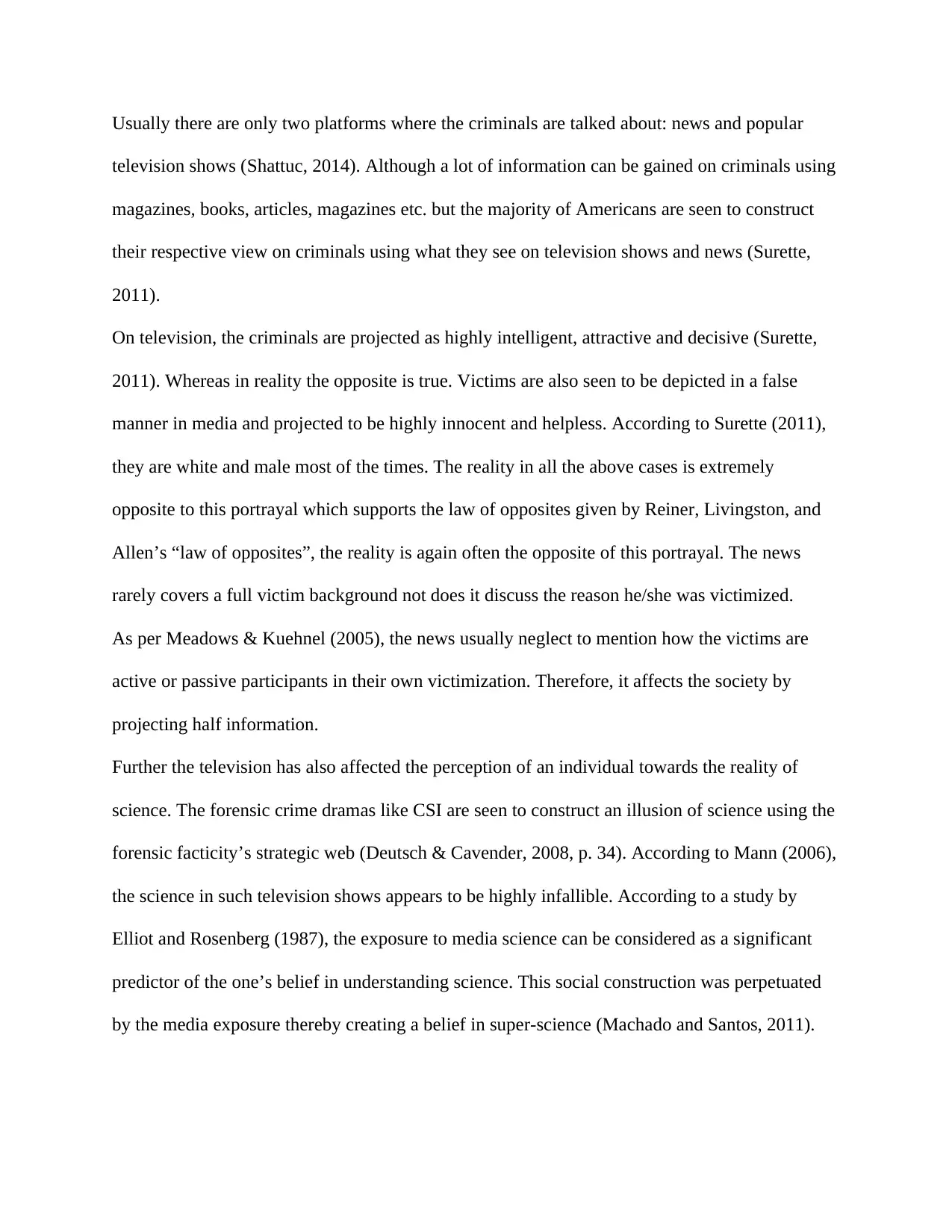
Usually there are only two platforms where the criminals are talked about: news and popular
television shows (Shattuc, 2014). Although a lot of information can be gained on criminals using
magazines, books, articles, magazines etc. but the majority of Americans are seen to construct
their respective view on criminals using what they see on television shows and news (Surette,
2011).
On television, the criminals are projected as highly intelligent, attractive and decisive (Surette,
2011). Whereas in reality the opposite is true. Victims are also seen to be depicted in a false
manner in media and projected to be highly innocent and helpless. According to Surette (2011),
they are white and male most of the times. The reality in all the above cases is extremely
opposite to this portrayal which supports the law of opposites given by Reiner, Livingston, and
Allen’s “law of opposites”, the reality is again often the opposite of this portrayal. The news
rarely covers a full victim background not does it discuss the reason he/she was victimized.
As per Meadows & Kuehnel (2005), the news usually neglect to mention how the victims are
active or passive participants in their own victimization. Therefore, it affects the society by
projecting half information.
Further the television has also affected the perception of an individual towards the reality of
science. The forensic crime dramas like CSI are seen to construct an illusion of science using the
forensic facticity’s strategic web (Deutsch & Cavender, 2008, p. 34). According to Mann (2006),
the science in such television shows appears to be highly infallible. According to a study by
Elliot and Rosenberg (1987), the exposure to media science can be considered as a significant
predictor of the one’s belief in understanding science. This social construction was perpetuated
by the media exposure thereby creating a belief in super-science (Machado and Santos, 2011).
television shows (Shattuc, 2014). Although a lot of information can be gained on criminals using
magazines, books, articles, magazines etc. but the majority of Americans are seen to construct
their respective view on criminals using what they see on television shows and news (Surette,
2011).
On television, the criminals are projected as highly intelligent, attractive and decisive (Surette,
2011). Whereas in reality the opposite is true. Victims are also seen to be depicted in a false
manner in media and projected to be highly innocent and helpless. According to Surette (2011),
they are white and male most of the times. The reality in all the above cases is extremely
opposite to this portrayal which supports the law of opposites given by Reiner, Livingston, and
Allen’s “law of opposites”, the reality is again often the opposite of this portrayal. The news
rarely covers a full victim background not does it discuss the reason he/she was victimized.
As per Meadows & Kuehnel (2005), the news usually neglect to mention how the victims are
active or passive participants in their own victimization. Therefore, it affects the society by
projecting half information.
Further the television has also affected the perception of an individual towards the reality of
science. The forensic crime dramas like CSI are seen to construct an illusion of science using the
forensic facticity’s strategic web (Deutsch & Cavender, 2008, p. 34). According to Mann (2006),
the science in such television shows appears to be highly infallible. According to a study by
Elliot and Rosenberg (1987), the exposure to media science can be considered as a significant
predictor of the one’s belief in understanding science. This social construction was perpetuated
by the media exposure thereby creating a belief in super-science (Machado and Santos, 2011).
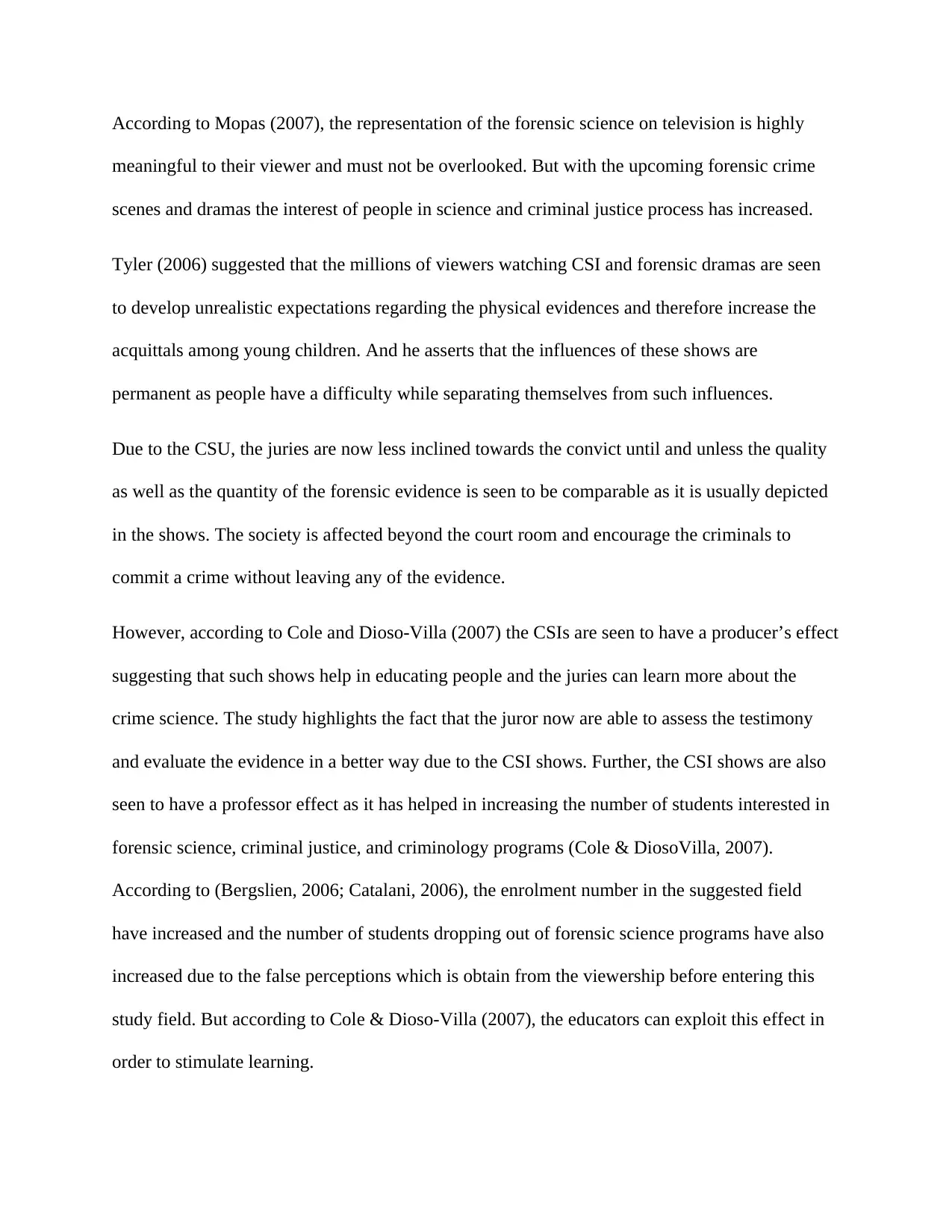
According to Mopas (2007), the representation of the forensic science on television is highly
meaningful to their viewer and must not be overlooked. But with the upcoming forensic crime
scenes and dramas the interest of people in science and criminal justice process has increased.
Tyler (2006) suggested that the millions of viewers watching CSI and forensic dramas are seen
to develop unrealistic expectations regarding the physical evidences and therefore increase the
acquittals among young children. And he asserts that the influences of these shows are
permanent as people have a difficulty while separating themselves from such influences.
Due to the CSU, the juries are now less inclined towards the convict until and unless the quality
as well as the quantity of the forensic evidence is seen to be comparable as it is usually depicted
in the shows. The society is affected beyond the court room and encourage the criminals to
commit a crime without leaving any of the evidence.
However, according to Cole and Dioso-Villa (2007) the CSIs are seen to have a producer’s effect
suggesting that such shows help in educating people and the juries can learn more about the
crime science. The study highlights the fact that the juror now are able to assess the testimony
and evaluate the evidence in a better way due to the CSI shows. Further, the CSI shows are also
seen to have a professor effect as it has helped in increasing the number of students interested in
forensic science, criminal justice, and criminology programs (Cole & DiosoVilla, 2007).
According to (Bergslien, 2006; Catalani, 2006), the enrolment number in the suggested field
have increased and the number of students dropping out of forensic science programs have also
increased due to the false perceptions which is obtain from the viewership before entering this
study field. But according to Cole & Dioso-Villa (2007), the educators can exploit this effect in
order to stimulate learning.
meaningful to their viewer and must not be overlooked. But with the upcoming forensic crime
scenes and dramas the interest of people in science and criminal justice process has increased.
Tyler (2006) suggested that the millions of viewers watching CSI and forensic dramas are seen
to develop unrealistic expectations regarding the physical evidences and therefore increase the
acquittals among young children. And he asserts that the influences of these shows are
permanent as people have a difficulty while separating themselves from such influences.
Due to the CSU, the juries are now less inclined towards the convict until and unless the quality
as well as the quantity of the forensic evidence is seen to be comparable as it is usually depicted
in the shows. The society is affected beyond the court room and encourage the criminals to
commit a crime without leaving any of the evidence.
However, according to Cole and Dioso-Villa (2007) the CSIs are seen to have a producer’s effect
suggesting that such shows help in educating people and the juries can learn more about the
crime science. The study highlights the fact that the juror now are able to assess the testimony
and evaluate the evidence in a better way due to the CSI shows. Further, the CSI shows are also
seen to have a professor effect as it has helped in increasing the number of students interested in
forensic science, criminal justice, and criminology programs (Cole & DiosoVilla, 2007).
According to (Bergslien, 2006; Catalani, 2006), the enrolment number in the suggested field
have increased and the number of students dropping out of forensic science programs have also
increased due to the false perceptions which is obtain from the viewership before entering this
study field. But according to Cole & Dioso-Villa (2007), the educators can exploit this effect in
order to stimulate learning.
Secure Best Marks with AI Grader
Need help grading? Try our AI Grader for instant feedback on your assignments.
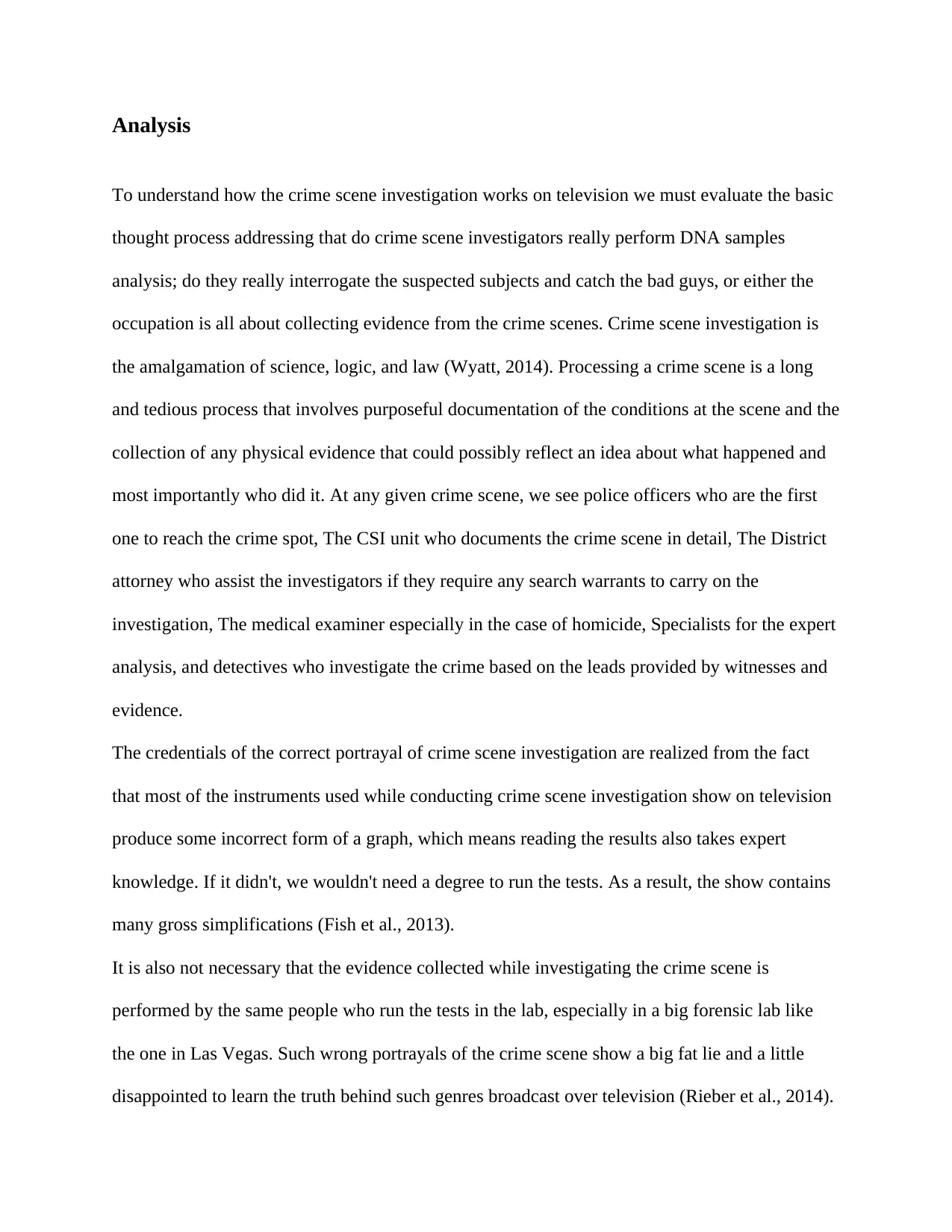
Analysis
To understand how the crime scene investigation works on television we must evaluate the basic
thought process addressing that do crime scene investigators really perform DNA samples
analysis; do they really interrogate the suspected subjects and catch the bad guys, or either the
occupation is all about collecting evidence from the crime scenes. Crime scene investigation is
the amalgamation of science, logic, and law (Wyatt, 2014). Processing a crime scene is a long
and tedious process that involves purposeful documentation of the conditions at the scene and the
collection of any physical evidence that could possibly reflect an idea about what happened and
most importantly who did it. At any given crime scene, we see police officers who are the first
one to reach the crime spot, The CSI unit who documents the crime scene in detail, The District
attorney who assist the investigators if they require any search warrants to carry on the
investigation, The medical examiner especially in the case of homicide, Specialists for the expert
analysis, and detectives who investigate the crime based on the leads provided by witnesses and
evidence.
The credentials of the correct portrayal of crime scene investigation are realized from the fact
that most of the instruments used while conducting crime scene investigation show on television
produce some incorrect form of a graph, which means reading the results also takes expert
knowledge. If it didn't, we wouldn't need a degree to run the tests. As a result, the show contains
many gross simplifications (Fish et al., 2013).
It is also not necessary that the evidence collected while investigating the crime scene is
performed by the same people who run the tests in the lab, especially in a big forensic lab like
the one in Las Vegas. Such wrong portrayals of the crime scene show a big fat lie and a little
disappointed to learn the truth behind such genres broadcast over television (Rieber et al., 2014).
To understand how the crime scene investigation works on television we must evaluate the basic
thought process addressing that do crime scene investigators really perform DNA samples
analysis; do they really interrogate the suspected subjects and catch the bad guys, or either the
occupation is all about collecting evidence from the crime scenes. Crime scene investigation is
the amalgamation of science, logic, and law (Wyatt, 2014). Processing a crime scene is a long
and tedious process that involves purposeful documentation of the conditions at the scene and the
collection of any physical evidence that could possibly reflect an idea about what happened and
most importantly who did it. At any given crime scene, we see police officers who are the first
one to reach the crime spot, The CSI unit who documents the crime scene in detail, The District
attorney who assist the investigators if they require any search warrants to carry on the
investigation, The medical examiner especially in the case of homicide, Specialists for the expert
analysis, and detectives who investigate the crime based on the leads provided by witnesses and
evidence.
The credentials of the correct portrayal of crime scene investigation are realized from the fact
that most of the instruments used while conducting crime scene investigation show on television
produce some incorrect form of a graph, which means reading the results also takes expert
knowledge. If it didn't, we wouldn't need a degree to run the tests. As a result, the show contains
many gross simplifications (Fish et al., 2013).
It is also not necessary that the evidence collected while investigating the crime scene is
performed by the same people who run the tests in the lab, especially in a big forensic lab like
the one in Las Vegas. Such wrong portrayals of the crime scene show a big fat lie and a little
disappointed to learn the truth behind such genres broadcast over television (Rieber et al., 2014).
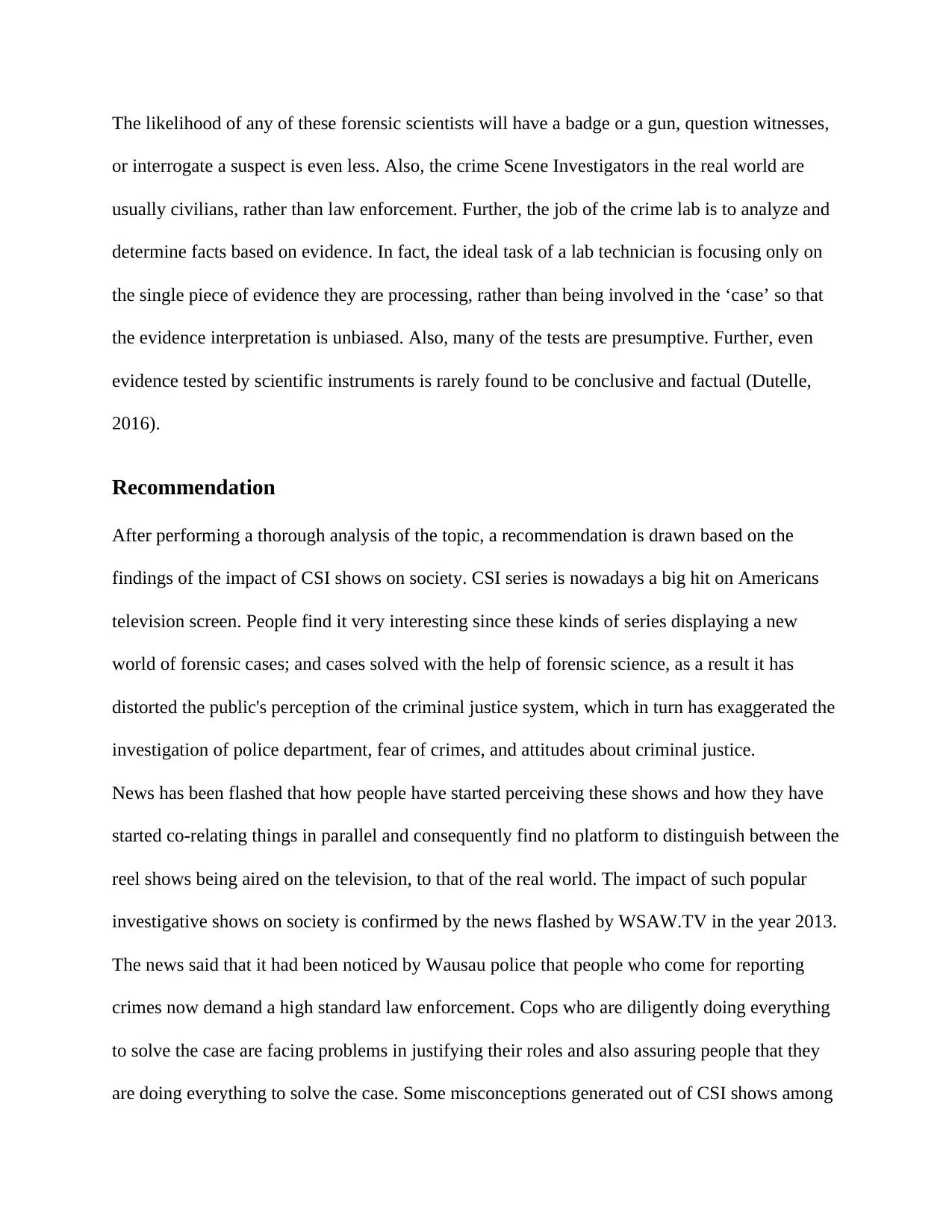
The likelihood of any of these forensic scientists will have a badge or a gun, question witnesses,
or interrogate a suspect is even less. Also, the crime Scene Investigators in the real world are
usually civilians, rather than law enforcement. Further, the job of the crime lab is to analyze and
determine facts based on evidence. In fact, the ideal task of a lab technician is focusing only on
the single piece of evidence they are processing, rather than being involved in the ‘case’ so that
the evidence interpretation is unbiased. Also, many of the tests are presumptive. Further, even
evidence tested by scientific instruments is rarely found to be conclusive and factual (Dutelle,
2016).
Recommendation
After performing a thorough analysis of the topic, a recommendation is drawn based on the
findings of the impact of CSI shows on society. CSI series is nowadays a big hit on Americans
television screen. People find it very interesting since these kinds of series displaying a new
world of forensic cases; and cases solved with the help of forensic science, as a result it has
distorted the public's perception of the criminal justice system, which in turn has exaggerated the
investigation of police department, fear of crimes, and attitudes about criminal justice.
News has been flashed that how people have started perceiving these shows and how they have
started co-relating things in parallel and consequently find no platform to distinguish between the
reel shows being aired on the television, to that of the real world. The impact of such popular
investigative shows on society is confirmed by the news flashed by WSAW.TV in the year 2013.
The news said that it had been noticed by Wausau police that people who come for reporting
crimes now demand a high standard law enforcement. Cops who are diligently doing everything
to solve the case are facing problems in justifying their roles and also assuring people that they
are doing everything to solve the case. Some misconceptions generated out of CSI shows among
or interrogate a suspect is even less. Also, the crime Scene Investigators in the real world are
usually civilians, rather than law enforcement. Further, the job of the crime lab is to analyze and
determine facts based on evidence. In fact, the ideal task of a lab technician is focusing only on
the single piece of evidence they are processing, rather than being involved in the ‘case’ so that
the evidence interpretation is unbiased. Also, many of the tests are presumptive. Further, even
evidence tested by scientific instruments is rarely found to be conclusive and factual (Dutelle,
2016).
Recommendation
After performing a thorough analysis of the topic, a recommendation is drawn based on the
findings of the impact of CSI shows on society. CSI series is nowadays a big hit on Americans
television screen. People find it very interesting since these kinds of series displaying a new
world of forensic cases; and cases solved with the help of forensic science, as a result it has
distorted the public's perception of the criminal justice system, which in turn has exaggerated the
investigation of police department, fear of crimes, and attitudes about criminal justice.
News has been flashed that how people have started perceiving these shows and how they have
started co-relating things in parallel and consequently find no platform to distinguish between the
reel shows being aired on the television, to that of the real world. The impact of such popular
investigative shows on society is confirmed by the news flashed by WSAW.TV in the year 2013.
The news said that it had been noticed by Wausau police that people who come for reporting
crimes now demand a high standard law enforcement. Cops who are diligently doing everything
to solve the case are facing problems in justifying their roles and also assuring people that they
are doing everything to solve the case. Some misconceptions generated out of CSI shows among
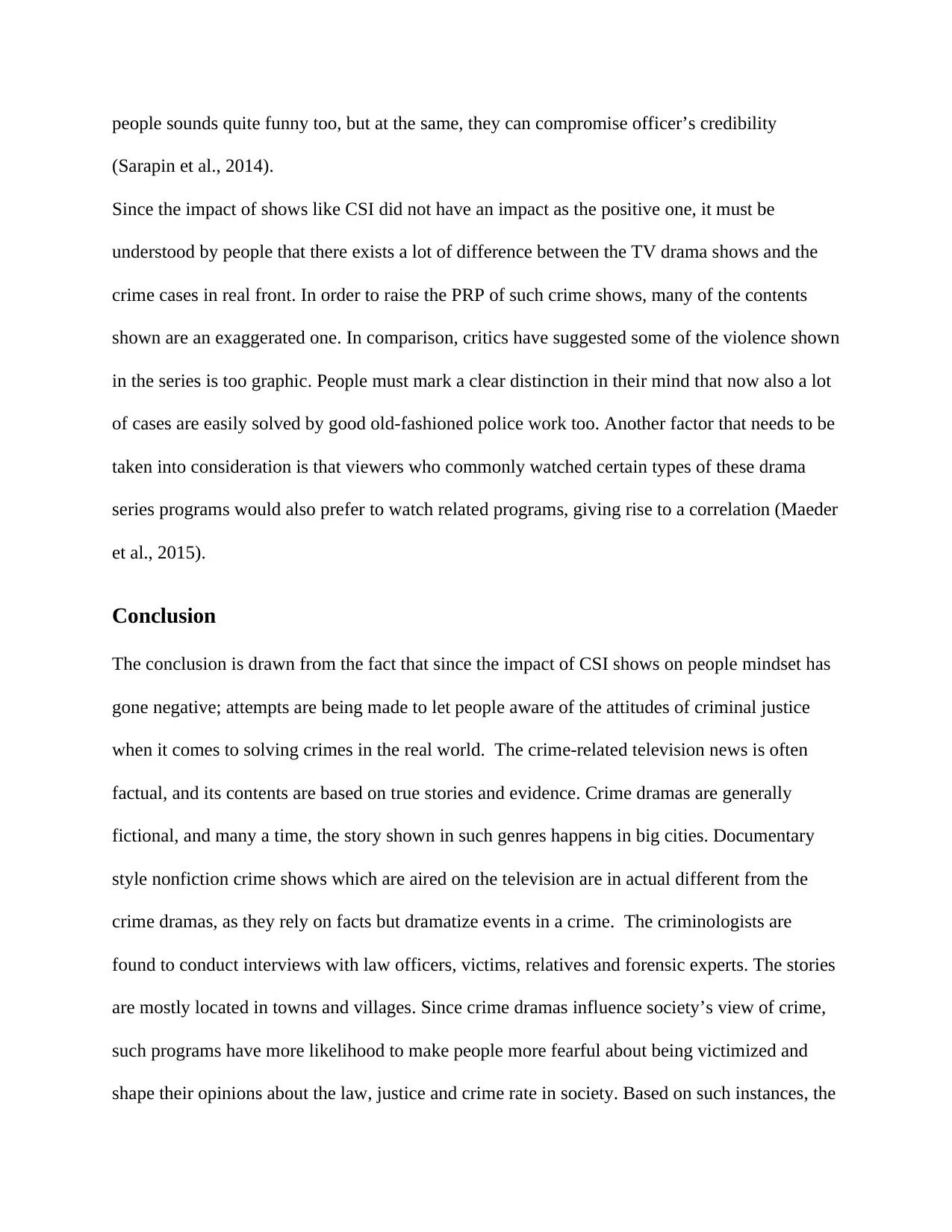
people sounds quite funny too, but at the same, they can compromise officer’s credibility
(Sarapin et al., 2014).
Since the impact of shows like CSI did not have an impact as the positive one, it must be
understood by people that there exists a lot of difference between the TV drama shows and the
crime cases in real front. In order to raise the PRP of such crime shows, many of the contents
shown are an exaggerated one. In comparison, critics have suggested some of the violence shown
in the series is too graphic. People must mark a clear distinction in their mind that now also a lot
of cases are easily solved by good old-fashioned police work too. Another factor that needs to be
taken into consideration is that viewers who commonly watched certain types of these drama
series programs would also prefer to watch related programs, giving rise to a correlation (Maeder
et al., 2015).
Conclusion
The conclusion is drawn from the fact that since the impact of CSI shows on people mindset has
gone negative; attempts are being made to let people aware of the attitudes of criminal justice
when it comes to solving crimes in the real world. The crime-related television news is often
factual, and its contents are based on true stories and evidence. Crime dramas are generally
fictional, and many a time, the story shown in such genres happens in big cities. Documentary
style nonfiction crime shows which are aired on the television are in actual different from the
crime dramas, as they rely on facts but dramatize events in a crime. The criminologists are
found to conduct interviews with law officers, victims, relatives and forensic experts. The stories
are mostly located in towns and villages. Since crime dramas influence society’s view of crime,
such programs have more likelihood to make people more fearful about being victimized and
shape their opinions about the law, justice and crime rate in society. Based on such instances, the
(Sarapin et al., 2014).
Since the impact of shows like CSI did not have an impact as the positive one, it must be
understood by people that there exists a lot of difference between the TV drama shows and the
crime cases in real front. In order to raise the PRP of such crime shows, many of the contents
shown are an exaggerated one. In comparison, critics have suggested some of the violence shown
in the series is too graphic. People must mark a clear distinction in their mind that now also a lot
of cases are easily solved by good old-fashioned police work too. Another factor that needs to be
taken into consideration is that viewers who commonly watched certain types of these drama
series programs would also prefer to watch related programs, giving rise to a correlation (Maeder
et al., 2015).
Conclusion
The conclusion is drawn from the fact that since the impact of CSI shows on people mindset has
gone negative; attempts are being made to let people aware of the attitudes of criminal justice
when it comes to solving crimes in the real world. The crime-related television news is often
factual, and its contents are based on true stories and evidence. Crime dramas are generally
fictional, and many a time, the story shown in such genres happens in big cities. Documentary
style nonfiction crime shows which are aired on the television are in actual different from the
crime dramas, as they rely on facts but dramatize events in a crime. The criminologists are
found to conduct interviews with law officers, victims, relatives and forensic experts. The stories
are mostly located in towns and villages. Since crime dramas influence society’s view of crime,
such programs have more likelihood to make people more fearful about being victimized and
shape their opinions about the law, justice and crime rate in society. Based on such instances, the
Paraphrase This Document
Need a fresh take? Get an instant paraphrase of this document with our AI Paraphraser
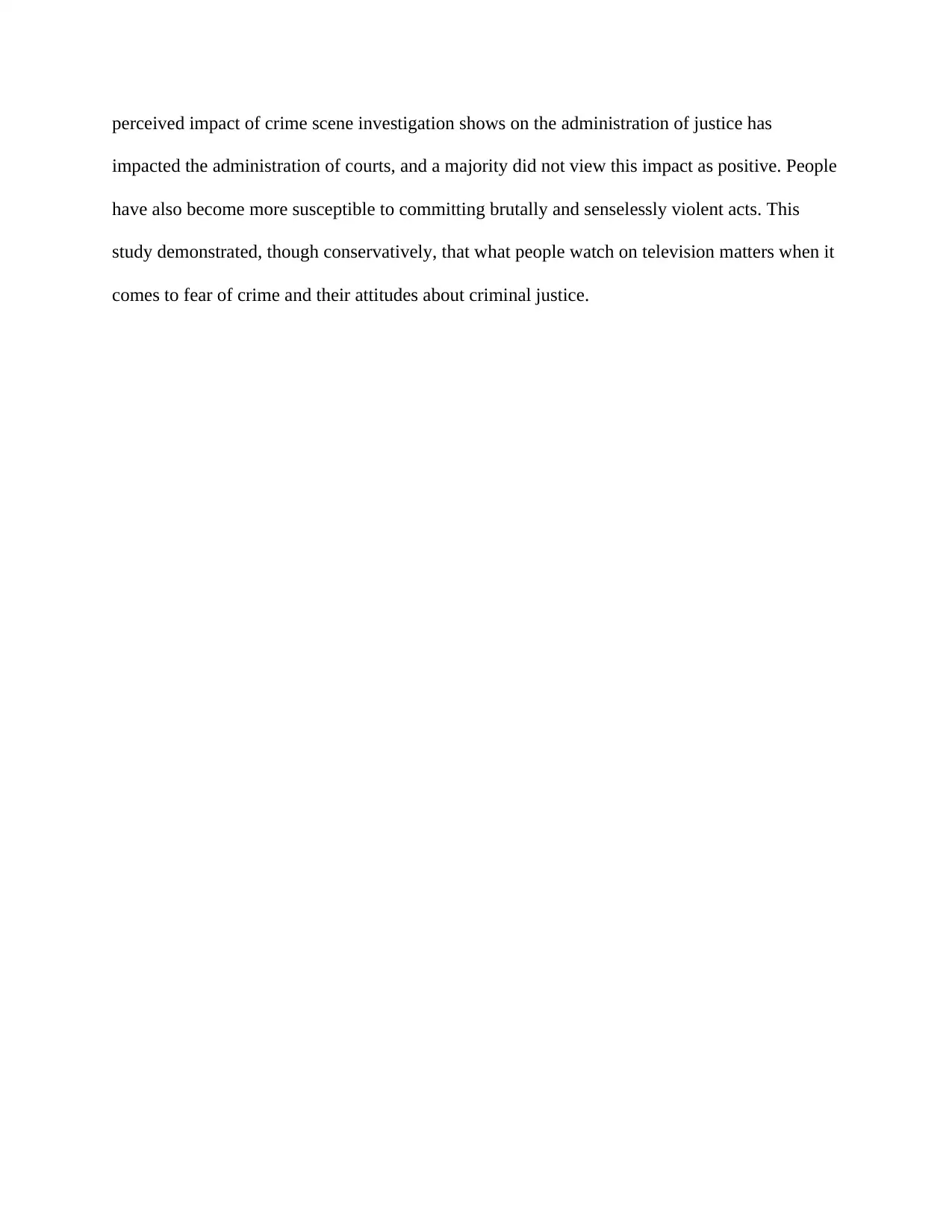
perceived impact of crime scene investigation shows on the administration of justice has
impacted the administration of courts, and a majority did not view this impact as positive. People
have also become more susceptible to committing brutally and senselessly violent acts. This
study demonstrated, though conservatively, that what people watch on television matters when it
comes to fear of crime and their attitudes about criminal justice.
impacted the administration of courts, and a majority did not view this impact as positive. People
have also become more susceptible to committing brutally and senselessly violent acts. This
study demonstrated, though conservatively, that what people watch on television matters when it
comes to fear of crime and their attitudes about criminal justice.
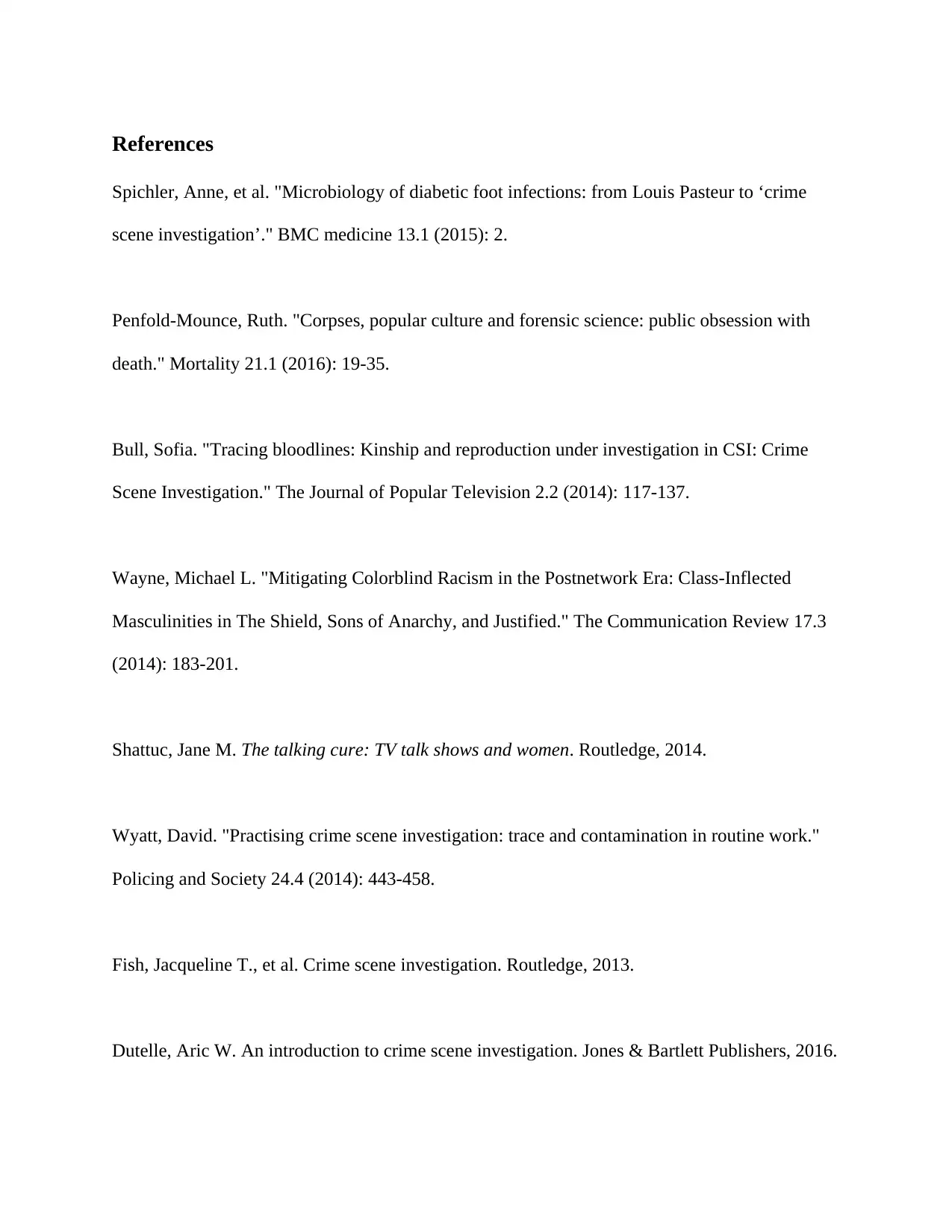
References
Spichler, Anne, et al. "Microbiology of diabetic foot infections: from Louis Pasteur to ‘crime
scene investigation’." BMC medicine 13.1 (2015): 2.
Penfold-Mounce, Ruth. "Corpses, popular culture and forensic science: public obsession with
death." Mortality 21.1 (2016): 19-35.
Bull, Sofia. "Tracing bloodlines: Kinship and reproduction under investigation in CSI: Crime
Scene Investigation." The Journal of Popular Television 2.2 (2014): 117-137.
Wayne, Michael L. "Mitigating Colorblind Racism in the Postnetwork Era: Class-Inflected
Masculinities in The Shield, Sons of Anarchy, and Justified." The Communication Review 17.3
(2014): 183-201.
Shattuc, Jane M. The talking cure: TV talk shows and women. Routledge, 2014.
Wyatt, David. "Practising crime scene investigation: trace and contamination in routine work."
Policing and Society 24.4 (2014): 443-458.
Fish, Jacqueline T., et al. Crime scene investigation. Routledge, 2013.
Dutelle, Aric W. An introduction to crime scene investigation. Jones & Bartlett Publishers, 2016.
Spichler, Anne, et al. "Microbiology of diabetic foot infections: from Louis Pasteur to ‘crime
scene investigation’." BMC medicine 13.1 (2015): 2.
Penfold-Mounce, Ruth. "Corpses, popular culture and forensic science: public obsession with
death." Mortality 21.1 (2016): 19-35.
Bull, Sofia. "Tracing bloodlines: Kinship and reproduction under investigation in CSI: Crime
Scene Investigation." The Journal of Popular Television 2.2 (2014): 117-137.
Wayne, Michael L. "Mitigating Colorblind Racism in the Postnetwork Era: Class-Inflected
Masculinities in The Shield, Sons of Anarchy, and Justified." The Communication Review 17.3
(2014): 183-201.
Shattuc, Jane M. The talking cure: TV talk shows and women. Routledge, 2014.
Wyatt, David. "Practising crime scene investigation: trace and contamination in routine work."
Policing and Society 24.4 (2014): 443-458.
Fish, Jacqueline T., et al. Crime scene investigation. Routledge, 2013.
Dutelle, Aric W. An introduction to crime scene investigation. Jones & Bartlett Publishers, 2016.
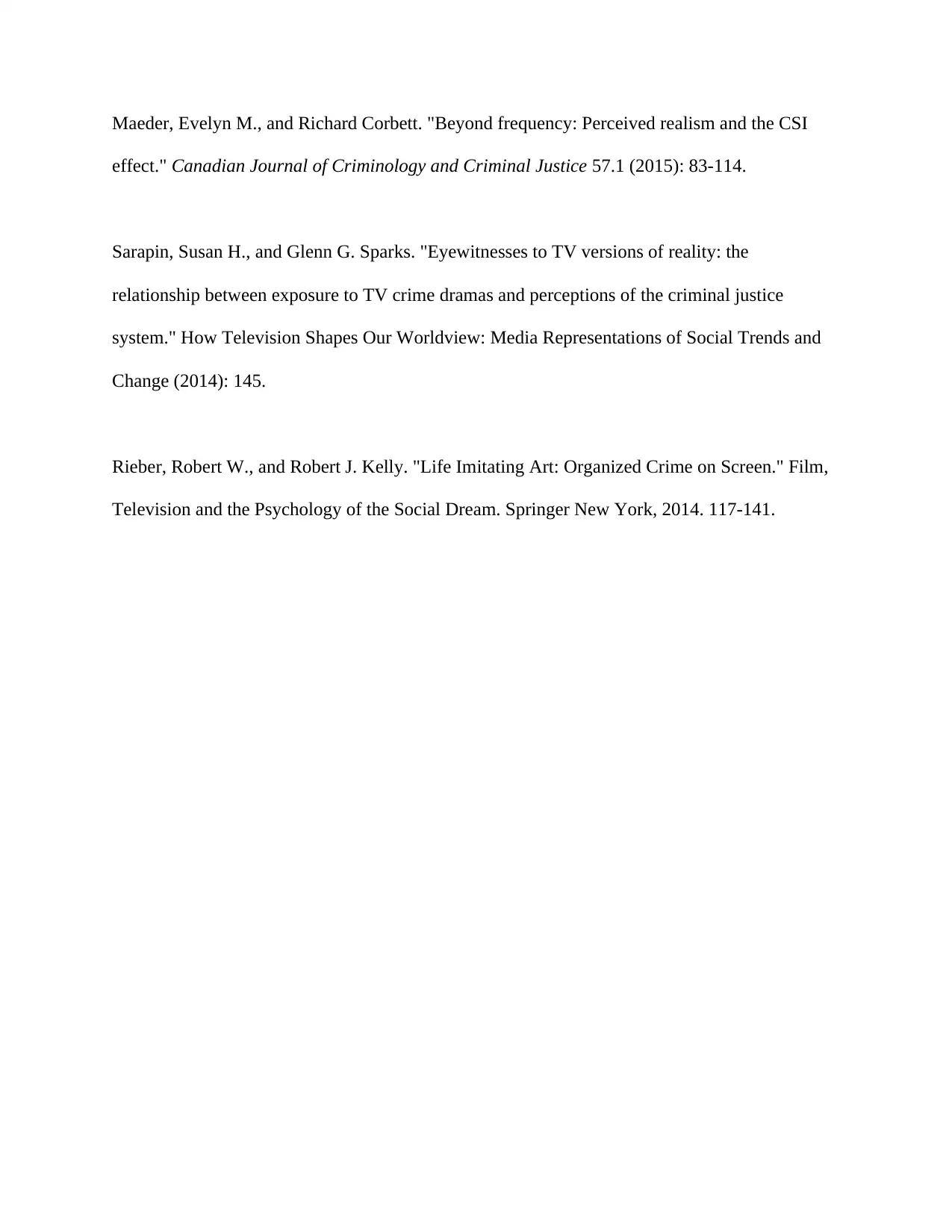
Maeder, Evelyn M., and Richard Corbett. "Beyond frequency: Perceived realism and the CSI
effect." Canadian Journal of Criminology and Criminal Justice 57.1 (2015): 83-114.
Sarapin, Susan H., and Glenn G. Sparks. "Eyewitnesses to TV versions of reality: the
relationship between exposure to TV crime dramas and perceptions of the criminal justice
system." How Television Shapes Our Worldview: Media Representations of Social Trends and
Change (2014): 145.
Rieber, Robert W., and Robert J. Kelly. "Life Imitating Art: Organized Crime on Screen." Film,
Television and the Psychology of the Social Dream. Springer New York, 2014. 117-141.
effect." Canadian Journal of Criminology and Criminal Justice 57.1 (2015): 83-114.
Sarapin, Susan H., and Glenn G. Sparks. "Eyewitnesses to TV versions of reality: the
relationship between exposure to TV crime dramas and perceptions of the criminal justice
system." How Television Shapes Our Worldview: Media Representations of Social Trends and
Change (2014): 145.
Rieber, Robert W., and Robert J. Kelly. "Life Imitating Art: Organized Crime on Screen." Film,
Television and the Psychology of the Social Dream. Springer New York, 2014. 117-141.
Secure Best Marks with AI Grader
Need help grading? Try our AI Grader for instant feedback on your assignments.

1 out of 14
Your All-in-One AI-Powered Toolkit for Academic Success.
+13062052269
info@desklib.com
Available 24*7 on WhatsApp / Email
![[object Object]](/_next/static/media/star-bottom.7253800d.svg)
Unlock your academic potential
© 2024 | Zucol Services PVT LTD | All rights reserved.



